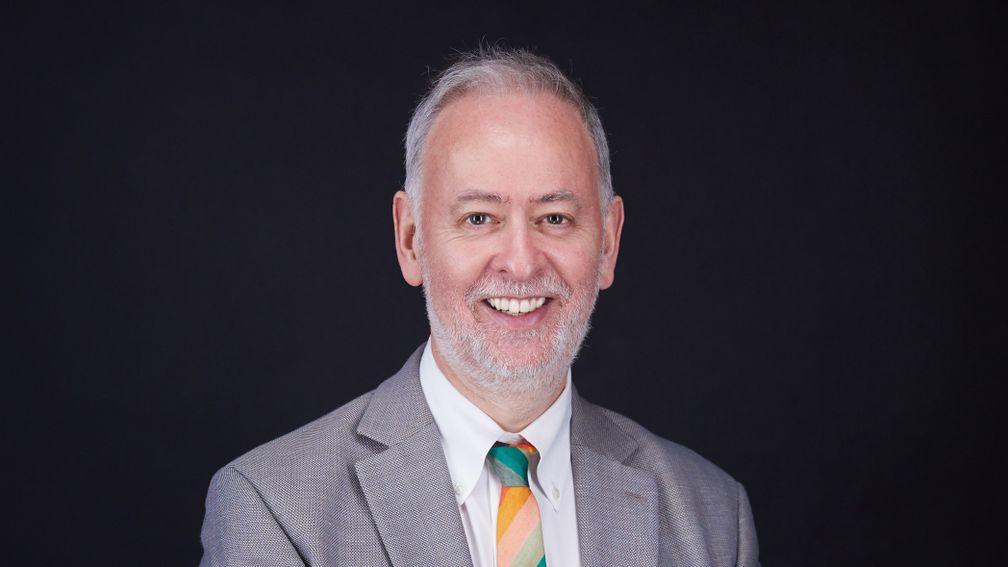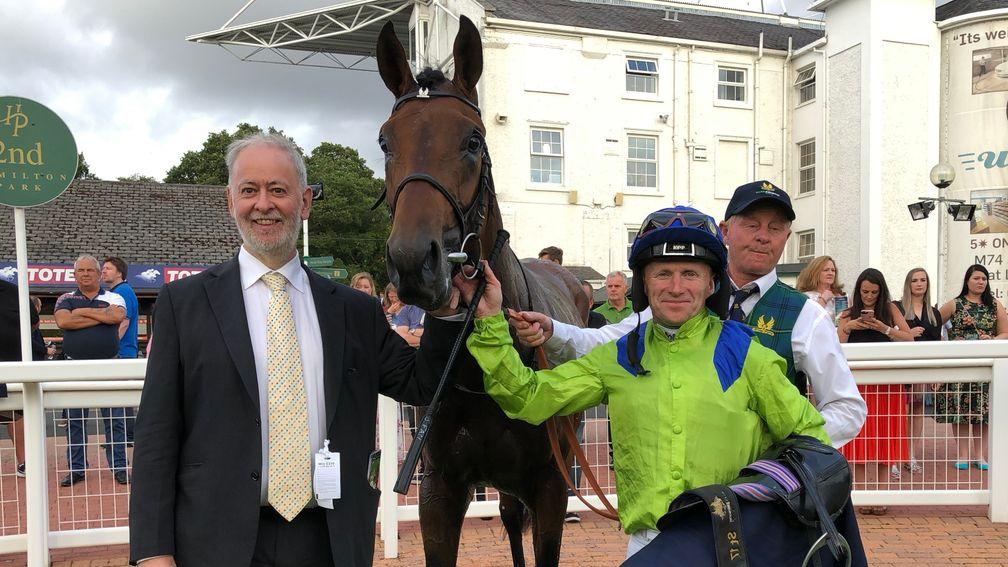- More
So, why would a leading economist choose to lose money by owning horses?
And how would Jim Walker sort out racing's finances? Martin Stevens finds out

Dr Jim Walker is an economist of international repute. In 2007, he founded the Asianomics Group, which provides the fund management industry with financial, corporate and technical consultancy.
He was formerly the chief economist at CLSA Asia-Pacific Markets and was voted the best regional economist by the Asiamoney Stockbrokers Poll between 1994 and 2004. He has regularly been acclaimed in the private Greenwich Surveys of fund managers in Asia, Europe and America.
He also shovels his own money down the biggest black hole possible – his words, not mine – by owning racehorses in Britain.
That is no reflection on his trainers, Mark Johnston and William Jarvis. In fact, they have just given the Scottish-born, Hong Kong-based Walker his best season: ten winners including Austrian School, who took a valuable Musselburgh handicap and finished third in the Henry II Stakes, and Subjectivist, runner-up in the Stonehenge Stakes.
Rather, it is because prize-money levels remain so pitifully low in Britain. As an economic expert who successfully forecast the Asian financial crisis of 1997 and the US downturn ten years later, and with skin in the game, Walker is uniquely placed to offer insight into the precarious state of racing's finances.
First off though, why does someone who advises fund managers on where to invest their millions willingly accept near-inevitable losses of their own expendable income by owning racehorses?
“I suppose it's a case of the heart overcoming the head,” says Walker. “Lots of my friends and colleagues are into sports cars, art collections, wine cellars and owning cricket teams (well, one anyway) but I've only ever had two real interests outside my family and my work – Greenock Morton (that’s a football team in case you were wondering, although some may argue otherwise) and racing.
“My mum and dad first took me to a race meeting when we were on holiday in Paignton in Devon when I was four – Devon and Exeter one week and Newton Abbot the next. I grew up with racing on the TV every Saturday – Arkle was strutting his stuff but I preferred Charlie Potheen – and then racing holidays every year. We used to go to Ayr for the Glasgow Fair summer meeting.
“That said, the economist in me is still alive and well. I never bet more than I can afford and I never overstretch myself in terms of horse purchases and training fees. My wife never tires in telling me that my natural pessimism – Scottish, Presbyterian, economist – disappears with the prospect of every new purchase, every runner and every horse I bet.”
There are limits to how much money Walker is prepared to lose in pursuit of his pastime, of course.
“If I was worried about balancing the books I wouldn't be involved in racehorse ownership,” he says. “Breeding, maybe. That doesn’t mean to say I'm happy turning a moderate fortune into a small one. Like most economists, I'll cut and run when required. There's no point in hoping that a bad horse will eventually sprout wings and turn into a world beater. Better to sell and move on.
“But the elation I feel when I have a winner at Southwell, never mind Newmarket, is worth the financial loss. 'One of these days…' is always at the front of my mind.”
Indeed, Walker does not think ownership should be undertaken in the pursuit of profit.

“That makes no logical sense whatsoever,” he says. “If you own a bad horse, or horses, they can’t possibly be expected to be financially rewarding.
“On the other hand, when you own decent horses, those that might regularly come third or fourth in decent races, it is soul destroying when the prize-money doesn’t even pay for their transport to the races. I have to say, although I'm pretty meticulous in my accounting for my horses, I never include entry fees, jockey fees and transport and racecourse expenses in my calculations or I would have gone bald long ago.
“What I firmly believe is that prize-money should make owners want to enter horses at meetings and do so with the full intention of trying to win. The current financial condition of UK racing encourages people to cheat – for example, run horses down the handicap or at inappropriate distances in order to land a big touch through betting. It might help if minimum guarantees, say £20,000, were imposed on all races for all courses.
"That would shake out a large number of loose holders – bad racecourse administrators – and 'sponsors' such as bookmakers, that are looking for something for nothing. Would that mean fewer races? Of course. But they would be of better quality and more honest.”
Surprisingly, perhaps, for the owner of a horse called Austrian School, the main economic school of thought espousing free markets, Walker is in favour of monopoly pool betting and thinks privately owned bookmakers should pay more for the privilege of taking bets on racing.
“The current system in the UK is a disaster,” he says. “It's open to too much abuse by vested interests such as bookmakers and racecourses. Hong Kong is a free-market economy but racing is run by a monopoly – the Hong Kong Jockey Club. Other countries, Australia and France for example, have betting systems that centre around a totalisator system. I think the UK should go in the same direction.
“The big bookmakers and the exchanges get a product for next to nothing that costs a lot in other jurisdictions. I wouldn’t do away with private-sector bookies but I would make them pay a lot more for what they receive. Same for the media outlets. And if they don’t like it? Fine.
“The UK should have a nationwide tote pool for every race at every meeting (this could consist of betting shop outlets, phone betting, online betting and on-course betting – Hong Kong, Australia and France are excellent examples that we could follow) where there is a percentage of all revenue held by the Tote for tax, prizes and investment in the industry – just like the bookies are supposed to do now but a fixed percentage.
"It should then co-mingle its betting and media rights globally where possible; obviously this would work better for the big meetings but an industry-wide division of the spoils could easily be envisioned."
Walker continues: “Payout from betting should be, for example, 70 per cent of total bets and the retained 30 per cent should be split one-quarter tax, one-quarter racing charity and one-half prize-money and racecourse expenses, or whatever percentages make most sense given experience around the world. Independent bookies and media could buy into the scheme but it would have to be administered by a central agency – a new, UK-style Jockey Club.
“If the betting turnover doesn’t support all of the courses and horses in training, so be it, we would have to move to racing two to four days a week and one, two or three meetings per day, wherever and whatever is the most in demand by the punter. That’s the free market bit.”

Walker's vision might sound out there, but then if you explained British racing's present economic model to people outside the industry many would likely think that was absurd too.
“There's lots of food for thought there, but it isn’t as if there aren’t examples elsewhere in the world that work much better than the ludicrous levy/hope-for-bookie-handout system we have in the UK at the moment,” he says.
“As for racecourses and their other sources of income, such as music concerts, by all means let them do that and charge accordingly; but for entry to an ordinary race meeting they should adopt the Hong Kong approach – $20 (the equivalent of £2) for the public stands. That would encourage loads more racegoers than are currently coming in at present.”
What has helped maintain Walker's interest in the sport, despite it being such a financial basket case, is his recent run of success including that first double-figure tally of winners in 20 years of ownership led by the Johnston-trained pair Austrian School and Subjectivist.
Asked to put his finger on what spurred the better results, he replies: “Truth be told, it's all about leaving the purchases to Mark Johnston and his son Charlie. Their approach to buying bloodstock – which I won’t give away, as it's proprietary! – makes complete logical sense to me and the results they have produced over the last two decades prove it.
“Of course, in this game everything is down to luck to some extent but a tried and trusted discipline in buying at the sales helps a huge amount. I can relate to that in my own professional life: it's how we ‘do’ economics for investors in Asia. In a nutshell though, the Johnstons are simply the best.”
Austrian School – who bears out the Johnstons' genius in purchasing big horses for small sums, having been sourced for 20,000gns but earning just shy of £170,000 in prize-money – is now retired, with a stud deal pending due to his close relationship with one of the most famous horses in training.
Walker explains: “Austrian School has been by far my best horse and touched 109 in the ratings before we were forced to retire him last year. Fingers crossed that the next Teofilo – Subjectivist – can reach the same heights, although nothing will match the name given how closely identified I have been with it throughout my professional life.
“Jerry O’Brien, Austrian School’s breeder – who also bred a half-brother called Tiger Roll, apparently quite well regarded in jumps circles – now has a full-brother to him at home in Ireland. I can’t wait to get my hands on him.”
Thank heavens British racing still has owners looking to campaign horses in the future in spite of its financial incoherence – even a renowned economist who by rights it should have sent running in the opposite direction.
If you enjoyed reading this, you might also like...
Nurlan Bizakov has grand ambitions for his newly purchased French stud
'Since we moved to Eyrefield we've really noticed how the stock has thrived'
Sam Haggas's eye for an improver showcased by Tattersalls-bound lots
Published on inFeatures
Last updated
- Private planes and public shame as bloodstock Santa Claus comes to Deauville
- 'This latest season has underlined his status as a breed-shaping sire' - Tony Morris's take on the 2024 European Pattern
- Broken glass and burst blood vessels at a totes emosh renewal of the December Foal Sale
- All work and no play makes James a dull boy at the Goffs November Sale
- Highs, lows and my Serbian counterpart provide a stern test of sales reporting stamina
- Private planes and public shame as bloodstock Santa Claus comes to Deauville
- 'This latest season has underlined his status as a breed-shaping sire' - Tony Morris's take on the 2024 European Pattern
- Broken glass and burst blood vessels at a totes emosh renewal of the December Foal Sale
- All work and no play makes James a dull boy at the Goffs November Sale
- Highs, lows and my Serbian counterpart provide a stern test of sales reporting stamina